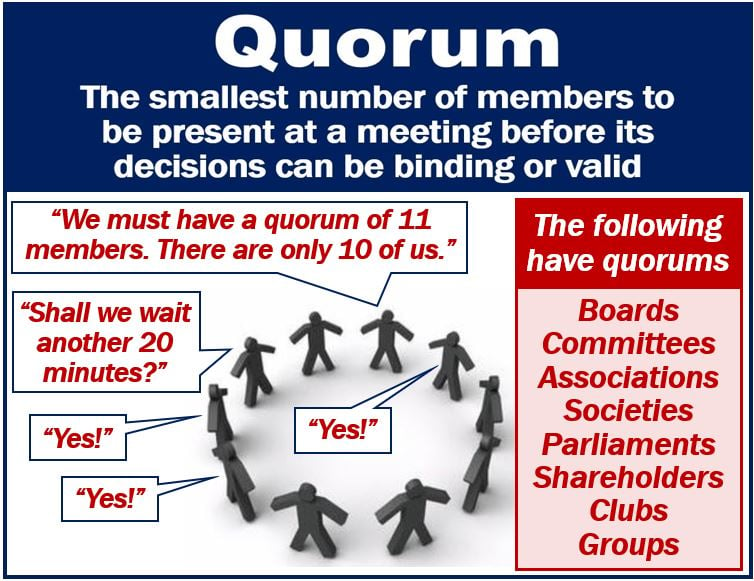A quorum is a minimum number of members who must be present for any decisions of a meeting to be binding or valid. Societies, assemblies, associations, businesses, parliaments, and other organizations often have a quorum. Especially when they want to change rules, regulations, or make policy decisions.
In most cases, when the number of people present does not meet the quorum, they can only take limited procedural actions. They may, for example, fix the time and date for the next meeting.
Quorum is a Latin word that means ‘of whom.’ It emerged in the English language with its modern meaning in the 1610s. Before the 1610s, it was used in Middle English in the wording of the commission to Justices of the Peace.
Middle English was the English people spoke in England after the Norman Conquest in 1066 until the late fifteenth century.
The Importance of Quorums
Quorums serve an essential function in the decision-making processes of various organizations, from business entities to government bodies. By setting a minimum attendance requirement, it ensures that decisions made represent a more substantial portion of the group, rather than being influenced by a small subset of members. This mechanism prevents potential abuse or actions that might not reflect the broader interest of the entire group.
Additionally, having a quorum in place ensures that the organization’s choices are legally binding and supported by a significant segment of its members.
Without a quorum, the risk of making uninformed or biased decisions increases. In legislative contexts, a quorum ensures that laws and policies reflect a broader consensus, enhancing their legitimacy and acceptance among the public. Similarly, in corporate settings, ensuring a quorum can prevent decisions that might benefit only a minority at the expense of the majority of shareholders.
Quorum – in business
In business, a quorum is a minimum number of eligible shareholders or stockholders who must be present. They may be present physically or by proxy. By proxy, means that a representative is at the meeting or assembly on a member’s behalf.
The terms shareholders and stockholders have the same meaning, i.e., people, institutions, or other entities that own shares in a company.
If the number of shareholders present is lower than the minimum requirement, decisions taken therein may not be legally binding.
In most cases, the company’s articles of association or bylaws specify the number for a quorum. If none is specified, they follow the number prescribed by law.

Quorum in parliament/government
-
United States
In the US, in both the House of Representatives and the Senate, the minimum is a simple majority of members.
Regarding exceptions, Wikipedia states:
“The only exception is that stated in the Twelfth Amendment, which provides that in cases in which no candidate for President of the United States receives a majority in the Electoral College, the election is decided by the House of Representatives, in which case ‘a quorum for this purpose shall consist of a member or members from two-thirds of the states,’ and in cases in which no candidate for Vice President of the United States has been elected, the election is decided by the Senate, in which case ‘a quorum for the purpose shall consist of two-thirds of the whole number of Senators.’”
-
United Kingdom
There is a quorum of 40 MPs, including the Speaker, in the House of Commons. MP, in this context, stands for Member of Parliament (not military police). The Commons has a total of 650 members.
Quorums do not need to be present all the time. In theory, debates could theoretically proceed even with just one MP and the Speaker present.
The minimum requirement for the House of Lords is 30 peers, including the Lord Speaker. The House of Lords has 753 peers.
-
Canada
The Constitution Act of 1867 states that 20 MPs must be present for sittings of the House of Commons of Canada to proceed. The Senate minimum is fifteen.
-
Australia
For sittings of the Senate and House of Representatives, one-third of the whole number of senators and MPs must be present. However, Parliament can change the quorum for each House by ordinary legislation.
-
India
At least 10% of the total number of members of the House must be present to constitute a meeting. This applies to either House of Parliament.
If fewer than the minimum number are present, the Chairman must either adjourn the House or suspend it.
